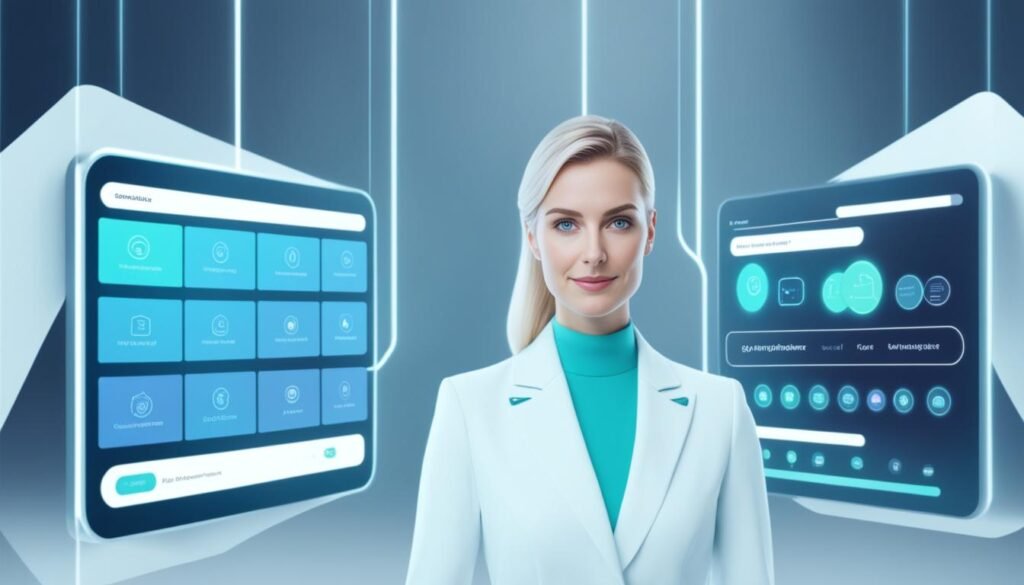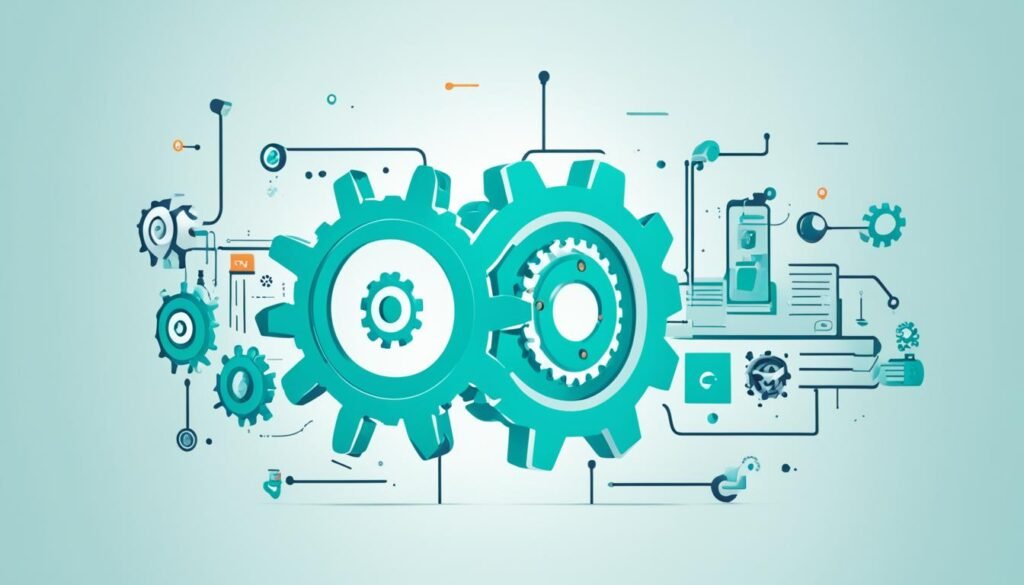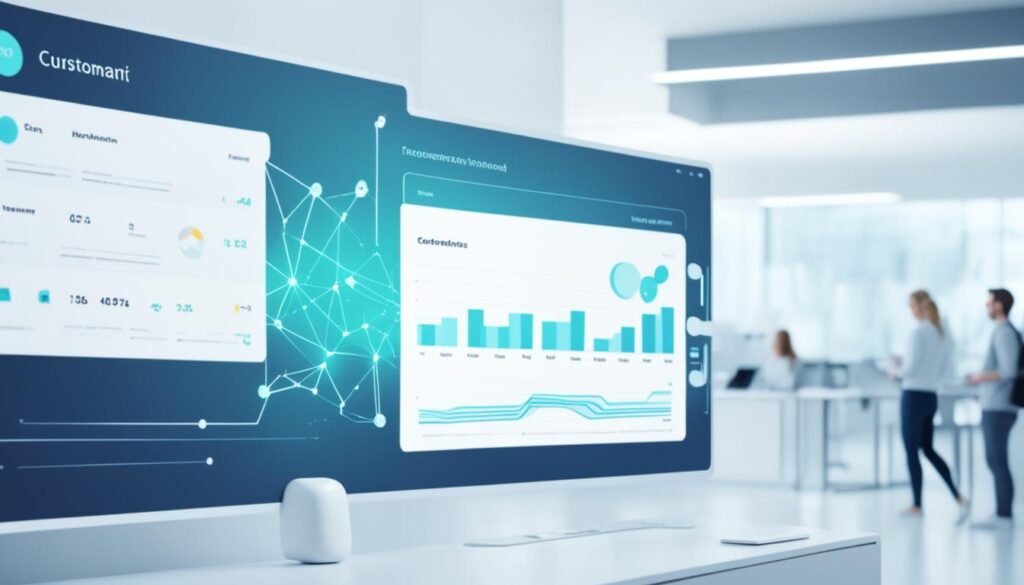The world of marketing is changing fast, thanks to Artificial Intelligence (AI) technologies. Tools like ChatGPT are leading this change. They make marketing more personal, helping businesses connect with customers in a meaningful way. By using personalization automation, marketers can make experiences that really speak to people. This builds stronger loyalty and leads to better results.
Now, Personalization Automation and AI tools like ChatGPT are key in a world full of generic ads. They use data and learning algorithms to target customers well. This means businesses can send messages and offers that match what their customers like and do.
This big change in marketing is opening up new ways to engage with customers. Today, people want experiences that feel made just for them. Companies that use Personalization Automation and AI will grab their audience’s attention. They’ll also lead their industries, ready for growth and success.
Table of Contents
Understanding AI in Personalization Automation
Artificial Intelligence (AI) is changing the marketing world. It lets marketers make campaigns that really speak to each customer’s likes. By using machine learning, predictive analytics, and natural language processing, marketers can understand what customers want better. This helps them plan their strategies better.
What is AI?
AI means machines and algorithms that think, learn, and decide like humans. In marketing, AI is a big deal. It helps marketers make campaigns that hit the mark, reaching people in a personal way.
AI’s Transformative Role in Marketing Evolution
Old-school marketing is out. AI lets marketers dig into big data to understand what customers like. This move from broad to specific strategies is huge, ushering in a new level of marketing success.
AI in Action: Real-World Examples
AI is used in many ways, like predicting trends, improving customer service, and making web content creation faster. Spotify uses AI to suggest music based on what users like. Sephora uses AI for virtual beauty advice, making shopping better and sales go up.
“AI isn’t just a tool; it’s a game-changer in marketing. It’s about leveraging machine learning, natural language processing, and predictive analytics to create highly targeted, personalized, and effective campaigns.”

Personalization Automation: The Future of Marketing
The blend of marketing automation and personalized engagement has changed how companies market themselves. Marketing automation uses software to make marketing tasks easier, automate boring tasks, and understand what customers like. This helps businesses target their audience better, help leads along, and make their marketing work better.
Personalization Automation means making marketing fit what each customer likes and needs. By using data-driven insights and smart algorithms, companies can really understand their customers. This lets them make marketing that feels just right for each person.
These two ideas together have started a new chapter in marketing. Now, businesses can use automation to give everyone a unique and interesting experience. This includes AI-made content, predicting what customers might want, and making campaigns better in real time.
As marketing keeps changing, using marketing Personalization Automation and personalized engagement will be key for companies to stand out. By using this new way, companies can gain more loyal customers, get more sales, and lead their industries.
“The future of marketing lies in the seamless integration of automation and personalization, empowering businesses to deliver tailored experiences that captivate and engage their target audience.”
The Power of Marketing Personalization Automation and Engagement
Personalization Automation Marketing and personalized engagement work together to make customer journeys feel personal. Marketing automation tools gather lots of data on how customers interact and behave. This data gives data-driven insights into what customers like, helping create content that really speaks to them.
Segmentation and Targeting
Businesses can segment their audience by different criteria. This way, they can send content and offers that fit each group better, making them more likely to buy. Marketing automation also lets businesses set up behavioral triggers. For example, sending emails if someone leaves items in their cart or showing products they’ve looked at before.
Personalized marketing gets more people involved and leads to more sales. When customers feel understood, they stick around longer and buy more. By making content just for certain groups, businesses grab their attention better, which means more sales.
- Personalization in marketing automation boosts customer engagement, making them more loyal and happy.
- Personalized upsells based on data can increase the total value of each order and how long customers stay with the business.
- Personalized marketing automation needs careful planning and ongoing testing to get better over time.
Personalization can be tricky because of the need for lots of data and the risk of being too invasive. It also requires making quick decisions. But, doing it right means clear customer groups, sending content that changes based on what customers do, and making sure the experience is the same everywhere.
“According to the State of Marketing Automation 2014, 66% of marketers cited enhanced targeting and personalization as top benefits of B2B marketing automation.”
Businesses using marketing Personalization Automation see more people getting involved and buying more. People open business text messages almost always, showing they’re really paying attention. About 75% of businesses use some kind of marketing automation for their customers.

Companies that mix automation with personal touches in email campaigns see big wins. Automation helps reach lots of people, while personal touches make each connection feel special. Using data to understand things like age, where they live, and what they like makes marketing automation way more effective.
Benefits of AI-Powered Marketing Personalization
Using artificial intelligence (AI) in marketing today brings many benefits. These include better personalization, deeper insights into customers, and more efficiency and scalability. AI helps create marketing content that speaks directly to each person. It offers personalized experiences and changes content based on what users like and do.
Enhanced Personalization
AI tools can guess what customers might want based on their past actions. This lets businesses meet customer needs and likes better. It helps create marketing that really speaks to people, making a stronger bond with customers. AI also changes content and offers right away, making the customer experience smooth and engaging.
Deeper Customer Insights
AI helps businesses look through huge amounts of data to find important customer info. This includes details about who they are, what they buy, and what they think. With this info, businesses can send marketing messages that hit the mark. AI helps marketers make smart choices that connect with customers deeply.
Increased Efficiency and Scalability
Adding AI to marketing automation makes routine tasks easier. This lets marketing teams focus on big-picture ideas. AI can handle personalizing content for lots of customers without needing more people. This means businesses can reach more people with better personalized messages, leading to more engagement and success.
By using AI in marketing, businesses can build stronger bonds with customers. This leads to loyalty and growth in a fast-changing digital world.
| Key Benefits of AI-Powered Marketing Personalization | Impact |
|---|---|
| Enhanced Personalization | Tailored marketing content and experiences that resonate with individual customers |
| Deeper Customer Insights | Valuable data-driven understanding of target audiences for more relevant messaging |
| Increased Efficiency and Scalability | Streamlined automated processes that drive personalization at scale |

“Advances in AI technologies will lead to even deeper personalization in customer experiences, predicting needs based on past behavior and real-time data analysis.”
Challenges and Considerations
AI-driven marketing automation is set to change how we interact with customers. But, it also brings challenges and things to think about. Data privacy and ethical concerns are big ones. These systems need a lot of customer data, which raises questions about protecting that data and avoiding biased algorithms.
Data Privacy and Ethical Concerns
Data privacy is more important than ever. Marketers must make sure their AI uses customer data in a way that follows strict rules and ethical standards. Finding the right balance between using data for personalization and respecting privacy is hard. It needs constant attention and open practices.
Integration and Compatibility
Adding AI tools to current marketing systems can be tough. It often needs a lot of technical know-how and resources. Making sure these systems work well together is key. System integration and compatibility issues can stop AI-powered personalization from working right.
Keeping up with Rapidly Changing Technology
The world of AI and evolving technology is moving fast. New tools and advancements come out all the time. Marketers need to keep learning and adapting to use AI well in their marketing. They should stay up-to-date with the latest news and best practices.
By tackling these challenges, marketers can make the most of AI in marketing. They can keep their personalization efforts ethical, efficient, and in line with new tech.

“76% of consumers get frustrated when organizations fail to deliver personalized interactions.”
Starting with AI personalization can be expensive, especially for small businesses. It’s important to plan carefully and use resources wisely. This helps make sure an AI-driven marketing strategy works well and lasts.
Unlocking the Power of AI Marketing Automation
Using AI in marketing automation is a big step, but it can lead to great success with the right plan. By knowing the challenges and planning well, businesses can use AI tools like ChatGPT. These tools help create personalized experiences, give data-driven insights, and make marketing more efficient.
It’s important to use AI in a balanced way. AI can make customer experiences better, but it should work with human creativity and strategy. Keeping data private, updating systems often, and mixing AI with human touch are key to using AI well.
Starting with AI marketing automation needs careful thought and knowing what tools can do. Tools like predictive analytics and content optimization can change how businesses talk to their customers. By keeping up with new tech and changing strategies, companies can use AI to its fullest potential.
AI marketing automation has its challenges, but with a smart plan, businesses can overcome them. By combining human skills with AI, companies can offer unique experiences, make decisions based on data, and see big wins in marketing.
- Maintain strict data privacy policies to ensure the ethical and responsible use of customer data.
- Regularly update AI systems to keep up with rapidly changing technology and ensure optimal performance.
- Blend AI-powered personalization with the human touch to create a balanced and engaging customer experience.
- Continuously stay informed about the latest advancements in AI marketing automation tools and adapt strategies accordingly.
- Prioritize seamless integration of AI into existing marketing workflows to maximize efficiency and productivity.
“Unlocking the power of AI marketing automation requires a thoughtful balance between data-driven insights and human creativity.”
Conclusion
Marketing automation and personalized engagement have changed the game for businesses. By using AI, companies can connect deeply with customers, build strong relationships, and lead in the market. This mix of AI and personalization is changing marketing, making businesses more successful and improving customer experiences.
Studies show that personalized messages get more attention and lead to more sales. When customers feel noticed, they stick with your brand and tell others about it. This personal touch can make you stand out in a crowded market. Using automation with personalization makes sales efforts more effective.
Big names like Amazon, Netflix, HubSpot, and Spotify use AI to give customers unique experiences. These companies use smart algorithms and automation to keep users coming back and buying more. As personalization becomes key to marketing success, businesses that use marketing automation and personal touch will do well in the future.




2 Comments on “Leveraging Personalization Automation For Marketing Experiences”